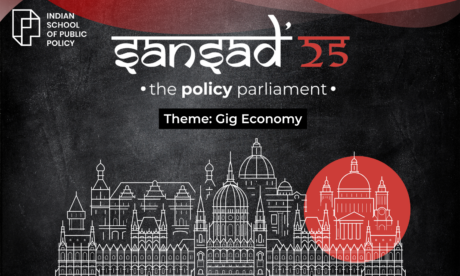Sansad 2025: The Policy Parliament

Register : Here
After the immense success of Sansad’23, focused on the Digital Competition Bill and subsequently tabled before the Competition Commission of India – the Indian School of Public Policy (ISPP) is back with Sansad ’25: The Policy Parliament, India’s premier model Bill drafting event. This year’s theme revolves around the Gig Economy.
Sansad’25 presents an exceptional chance to participate in a constructive discussion on the Gig Worker’s Rights and Social Security Bill. Gig Economy – the new era of doing business has brought a model of work where more independence of work arrangements for short duration is enabled by digital platforms. The Gig Economy provides a unique opportunity to India for the formalisation of its vast services in the informal sector. Recognising this, the Government of India took its first step by defining gig workers in Chapter I, Section 2(35) of the Code on Social Security, 2020 as “a person who participates in a work arrangement and earns from such activities outside of a traditional employer-employee relationship.” The definition separates Gig workers from regular employees and other non-employee classes of workers. As Gig work continues to expand, it is imperative to establish robust policies that provide social security, fair wages, and dispute resolution mechanisms, thereby creating a more equitable and sustainable Gig Economy.
Highlights from Sansad 2023
In this event, researchers and professionals will deliberate upon a comprehensive law governing the Gig Economy, which will be tabled in the relevant government department. The event will consist of 12 teams of 3-4 members each will research and deliberate on six suggested Chapters that will be included in the model draft Bill, namely:
- Labour regulations- Minimum wages, working conditions, and Safety
- Social security benefits and welfare board – registration on social security platform, Composition and Distribution of Fund, Composition and functions of the board.
- Regulations of platforms/ Aggregators/ Businesses
- Data protection and privacy of platform workers
- Collective Advocacy and Representation
- Grievance redressal and dispute settlement
Further, each team will receive a brief on their assigned Chapter and a set of questions to guide their research after their abstract.
Registration:
- Participants will have the flexibility to choose their team members, and will be required to submit an abstract not exceeding 500 words on the topic “Future of Labour Rights in Gig Economy”
- The last date for registration and abstract submission is 6 April 2025.
- The Organising Team will shortlist 12 teams and allocate Chapters based on the teams’ preferences.
- The shortlisted teams must confirm their participation by paying a participation fee of INR 700/- per person after their abstract selection.
WHY PARTICIPATE?
- Exciting Cash prizes and participation certificates.
- Meet and interact with experts during the panel discussion on the Gig Economy in India.
- Opportunity to have your provisions presented to the concerned officials in the government department.
We look forward to your participation and engagement in this crucial event.
Event Format
Theme: Gig Workers’ Rights and Protection Bill.
The event will span two days, combining expert insights, team-based deliberations, and a final voting process to draft a model policy framework.
Day 1: Expert Insights & Thematic Discussions
- Opening Ceremony: Keynote address from industry and policy leaders.
- Panel Discussion:“Balancing Flexibility and Worker Rights in the Gig Economy”
- Deliberation Sessions: Team-based discussions to draft policy provisions.
Day 2: Policy Drafting & Finalisation
●Review and Amendments: Teams will refine their chapters after feedback.
● Final Reading & Voting: The consolidated Policy will be presented for voting.
● Judging & Awards: Experts will evaluate team contributions, and awards will be distributed.
○ Best Team
○ Best Leader
○ High recommendation – Team
○ Special Mention – Leader
Focus Areas of the Proposed Bill
1. Social Security & Worker Benefits – Ensuring life and disability cover, accident insurance, health and maternity benefits, and old-age protection to provide long-term security for gig workers.
2. Fair Wages & Working Conditions – Establishing minimum wage regulations, preventing unjust dismissal, and setting working hour limitations to safeguard worker rights and ensure stable incomes.
3. Dispute Resolution Mechanism – Creating accessible grievance redressal channels to help gig workers resolve conflicts fairly and efficiently.
4. Skill Development & Economic Mobility – Introducing upskilling programs and partnerships with vocational training institutes to enhance career growth and provide better economic opportunities.
Expected Outcomes
✅ A comprehensive policy report with key recommendations for the Gig Workers’ Rights and Protection Bill.
✅ Submission of the model Bill to policymakers for consideration.
✅ Creation of an industry-academia dialogue on improving gig worker conditions.
✅ A platform for young policy professionals to engage in real-world policymaking.








